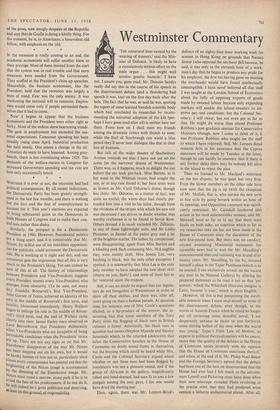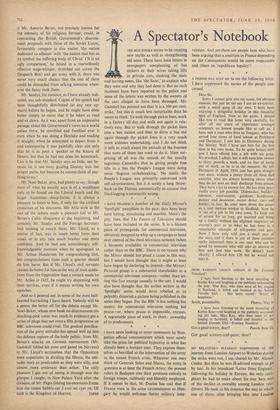Westminster Commentary
'Tim unnatural heat caused by the wearing of trousers,' said the Min- ister of Defence, is likely to have a cumulatively serious effect on the male organ . . . this might well involve genetic hazards.' I have not, I assure you, gone mad; Mr. Duncan Sandys really did say this in the course of his speech in the disarmament debate (and a thundering bad speech it was, too) on the first day back after the hols. The fact that he was, or said he was, quoting the report of some learned Swedish scientific body which had concluded its researches by recom- mending the universal adoption of the kilt (per- haps I have gone mad after all) is neither here nor there. From now on I shall meet my friends among the dramatic critics with thumb to nose; while the Earl of Scarbrough can wield a blue pencil they'll never hear dialogue like that in their line of business.
But talk of the wider theatre of Shaftesbury Avenue reminds me that I have not yet set the scene for the narrower drama of Westminster. There was, as it happens, much to delight the eye before the ear took, pot-luck. Miss Burton, as is her wont in the Whitsun recess, had sought the sun, or at any rate found it; her bare arms were as brown as Mr. Cyril Osborne's dome, though less shiny. Mr. Osborne, as a matter of fact, was quite an eyeful; the warm days had clearly per- suaded him into a visit to his tailor, though from the vividness of the stripes with which his new suit was decorated I am driven to doubt whether that worthy craftsman is to be found in Savile Row. Others dressed a la mode included Mr. Zilliacus, in one of those lightweight suits, and Sir Leslie Plummer, in flannel of the palest grey and a tie of the brightest scarlet. The ladies, by comparison, were disappointing; apart from Miss Burton and a blinding pink flash containing Mrs. McLaughlin they were mostly drab. Miss Jennie Lee, very fetching in black, was the only other exception I spotted; it is noteworthy that Miss Lee is the only lady member to have adopted the new short skirt (shame on you, Babs!), and none of them has so far ventured upon the trapeze.
Still, it can no doubt be argued that our legisla- tors do not foregather at Westminster in order to show off their clothes, and there was, after all, more going on than a fashion parade. At question time, for instance, one of Mrs. Castle's questions elicited, as a by-product of the answer, the in- teresting fact that some members of the Tory Party think the flogging of black men in British colonies is funny. Admittedly, the black men in question had names (Stephen Mpande and Stanley Jeremiah) which, to the retarded adolescents that infest the Conservative benches in the House of Commons, no doubt sound funny in themselves, but the braying which could be heard while Mrs. Castle and the Colonial Secretary argued about whether or not these men had been flogged by instalments was not a pleasant sound, and if the group of Africans in the gallery, magnificently robed and head-dressed, had seen fit to toss a few assegais among the assy guys, I for one would have dried the starting tear.
Then, again, there was Mr. Lennox-Boyd's defence of an eighty-four-hour working week for women in Hong Kong on grounds that Nassau Senior (who opposed the ten-hour Bill because, he said, it was only in the eleventh hour of a work- man's day that he began to produce any profit for his employer, the first ten having gone on meeting the overheads) would have found intellectually contemptible. I have nevef believed all that stuff 1 was taught at the London School of Economics about the folly of Opposing imports of goods made by sweated labour because only expanding markets will enable the labour-sweaters to im- prove pay and conditions; but the Colonial Sec- retary, I will swear, has not even got as far as that. He might do worse than attend Professor Robbins's post-graduate seminar for Conservative Ministers (though, now I come to think of it, it was Professor Robbins who taught me the stuff to which I have referred). Still, Mr. Lennox-Boyd remains firm in his assurance that the Cyprus statement will be made by Tuesday at the latest, though he can hardly be unaware that if there is any further delay there may be nobody left alive in the island to reject the plan.
Then we listened to Mr. Macleod's statement on the bus dispute; he was quiet but very firm. Even the slower members on the other side have now seen that the jig is up (with the exception of Mr. Mellish, that is, who started the new term in fine style by going berserk within an hour of its opening), and Opposition comment was signifi- cantly restrained. Mr. Gaitskell lumbered into action in his most statesmanlike manner, and Mr. Shinwell went so far as to say that there were faults on both sides, an assertion which as far as my researches take me has not been made in the House of Commons since the discussion of the new five-pound note. But there was no comfort; anyone examining Ministerial statements for agreeable news had to wait for Mr. Maudling's announcement that coal rationing was to end after twenty years. Mr. Maudling, by the by. ensured himself a place in the Taper Pantheon (which is to be erected, I can exclusively reveal, on the vacant site next to he Naional Gallery) by altering his prepared statement as he read it out so that 'per annum,' which the Whitehall illiterates imagine is Latin, became 'a year,' which is plain English.
However, all this is but postponing the inevit- able moment when I must steel myself to write of the disarmament debate, even though, in the words of Anatole France when he could no longer put off reviewing some dreadful novel, '1 am desperately anxious to recite to you forthwith some stirring ballad of the time when the world was young.' Taper's Fifth Law of Motion, as experts in political thermodynamics will be aware, states that `the quality of the debates in the House of Commons varies inversely with the opinion that the House of Commons entertains thereof,' and when, at the end of it, Mr. Philip Noel-Baker and the Foreign Secretary agreed that the debate had been one of the best on disarmament that the House had ever had I felt much as the astrono- mers Lowell and Pickering must have done when their new telescope revealed Pluto revolving in the precise orbit that they had predicted must contain a hitherto undiscovered planet. After all, if Mr. Aneurin Bevan, not precisely, known for the intensity of his religious fervour, could, in contrasting the British Government's disarma- ment proposals with those of the Soviet Union, favourably compare in this matter 'the nation dedicated to atheism' with 'the nation that has as its symbol the suffering body of Christ' (`It is an ugly comparison,' he hissed in a marvellously effective stage-whisper, stretched out across the Despatch Box) and get away with it, there was never very much chance that the rest of them could be dissuaded from talking nonsense when- ever the fancy took them.
Mr. Sandys, for instance, as I have already indi- cated, was sub-standard. Copies of his speech had been thoughtfully distributed (at any rate up- stairs) before he began, and he might have done better simply to move that it be taken as read and sit down. As it was, apart from an impressive passage about the Government's views on a world police force, he stumbled and fumbled over it even when he was doing a Hoylake and reading it straight; when he attempted to depart from it and extemporise it was painfully clear not only that he is as poor a speaker as the Knave of Hearts, but that he had not done his homework. Can it be that Mr. Sandys says so little, not be- cause he is too busy guiding Destiny into her proper paths, but because he cannot think of any- thing to say?
Mr. Noel-Baker, pere, had plenty to say; though most of what he usually says is of a woolliness only to be found on the Liberal bench and the larger Australian sheep-farms, it is always a pleasure to listen to him, if only for the civilised classicism of his discourse. His Attic style at the' end of the debate made a pleasant foil to Mr. Bevan's Celtic eloquence at the beginning, and certainly Mr. Sandys and the Foreign Secretary had nothing to match them. Mr. Lloyd, as a matter of fact, was in much better form than usual, or at any rate much brasher and more confident. And he had one astonishingly self- knowledgeable moment when he apologised to Mr. Arthur Henderson for congratulating him, lest congratulationS from such a quarter should do him harm. But if Mr. Lloyd's civil servants cannot do better for him in the way of trick quota- tions from the Opposition than a remark made by Mr. Attlee in 1935, he might try dispensing with their services, even if it means writing his own speeches.
And so it petered out, in some of the most half- hearted barracking I have heard. Nobody will be a penny the better off for the debate except Mr. Noel-Baker, whose new book on disarmament (its shocking-pink cover was much in evidence) got a series of plugs that not even a film programme on BBC television could rival. The gradual petrifica- tion of the party attitudes has spread well up into the defence regions of the body politic; from Mr. Bevan's attacks on German rearmament (Mr. 'Gaitskell folded his arms and gazed on Nirvana) to Mr. Lloyd's accusation that the Opposition were unpatriotic in dividing the House, the atti- tudes were as predictable as they were silly, and almost more irrelevant than either. The only pleasure I got out of seeing it through was the glimpse I caught, in New Palace Yard after the division, of Mr. Paget folding his enormous frame into the tiniest bubble-car I ever set eyes on. Of such is the Kingdom of Heaven. TAPER



































 Previous page
Previous page